What do ordinary Taiwanese think of the upcoming meeting between Ma Ying-jeou (馬英九) and Xi Jinping (習近平)? For the time being, the only way to know is to ask them personally. Because the meeting was arranged in secrecy and only leaked to the press last night, just days before it is set to take place, scientific polling data is at least a couple days away. Given that timing crunch, some companies may elect to wait until after the meeting has concluded to collect data on it, in which case they wouldn’t publish their results for at least another week.
That said, past polls about Ma and Xi, the Chinese Nationalist Party (KMT) and Chinese Communist Party (CCP), and cross-strait relations from the neutral Taiwan Indicators Survey Research (TISR), the pan-blue TVBS network, and the pan-green Taiwan Brain Trust (TBT) provide valuable context that can help us predict where Taiwanese stand on the matter.
Taiwanese generally open to cross-strait talks, but…
In a mid-September TBT poll, 54.1% agreed with the statement that Taiwan and China can establish an equal and friendly fraternal relationship, while 37.5% disagreed and 8.4% were undecided. Asked if they feel positively, negatively, or apathetically towards China, 18.7% of respondents were positive, 37.3% were negative, and 38.5% were apathetic, with just 3.5% undecided.
The last TVBS poll about government-to-government cross-strait talks was taken in February 2014, in the wake of a historic official meeting between Taiwan’s then-Mainland Affairs Council Minister Wang Yu-chi (王郁琦) and Taiwan Affairs Office Minister Zhang Zhijun (張志軍) in China. Until now, this had been the high watermark of cross-strait rapprochement, as the very next month brought the Sunflower Movement that halted the momentum toward closer ties.
According to that February poll, 47% believed the Wang-Zhang meeting would help the development of cross-strait relations, while 27% disagreed. Overall, 36% were satisfied with Wang’s performance at the meeting, 24% unsatisfied, and 40% undecided.
TVBS noted Wang and Zhang both expressed support for the “1992 Consensus” and asked if citizens supported developing cross-strait relations on the basis of the 1992 Consensus overall; 39% said yes and 25% no, with 37% undecided.
Next, TVBS noted the two sides of the strait were discussing the Straits Exchange Foundation and the Association for Relations Across the Taiwan Straits, Taiwan’s and the PRC’s respective semi-official cross-strait relations units created in 1991, establishing offices in each other’s territory. Citizens supported such a reciprocal establishment of offices 66% to 19%.
Finally, TVBS asked: “If he had the opportunity, would you support President Ma Ying-jeou meeting with Chinese national chairman Xi Jinping?” 50% said yes, 35% said no, and 15% had no opinion.
However, support for Ma meeting Xi is not equivalent to approval of Ma’s handling of cross-strait relations. In a May 2015 TVBS poll, 35% of citizens said they were satisfied with Ma’s performance in this area (a 16-point drop from 2011), but 55% said they were unsatisfied. Furthermore, 46% thought Ma was taking the country in the wrong direction, and just 30% that he was taking it in the right direction; in April 2014 when Ma was trying to get the cross-strait services pact approved without acceptable oversight, 53% of Taiwanese thought he was taking the nation in the wrong direction while just 24% thought he was going in the right direction.
Another factor to keep in mind is that past polls about Ma meeting Xi were pre-Sunflower Movement and hypothetical. Citizens could imagine the ideal conditions for a meeting before responding. Thus the real-life circumstances of the upcoming Ma-Xi meeting, with its suddenness, secrecy, and proximity to the election, may turn otherwise welcoming citizens against it.
TVBS Sunflower Movement polls in April 2014 showed that while a plurality of the public disapproved of the cross-strait services pact the Ma administration signed, a huge majority disapproved of the Ma administration’s so-called “black box” methods in trying to push the agreement’s ratification through the Legislature without sufficient oversight. Likewise, in its statement today, the DPP chose to criticize Ma’s “black box” arrangements rather than the concept of a president-to-president meeting itself, and popular Taipei Mayor Ko Wen-je (柯文哲), elected last year with 57% of the vote on a platform of transparency and direct democracy, stated today that the Ma administration should have given the public time to form a consensus about this meeting instead of rushing the country into the summit.
The KMT frequently campaigns on its claim to have unique ability and skill in cross-strait dialogue. However, a TISR poll in late July 2015 indicates most Taiwanese support and are optimistic about future cross-strait talks by the Democratic Progressive Party (DPP) and its candidate Tsai Ing-wen (蔡英文). The following three sets of questions and answers come from that poll:
Do you believe that after taking power next May 20, the new administration should talk with the Communist Party of China about the future cross-strait relationship under a new premise that would replace the 1992 Consensus?
Yes: 59.5%
No: 16.6%
Don’t Know/No Response: 23.9%
The Communist Party has proposed several times cross-strait political talks as a way to resolve political differences, including those on the cross-strait relationship, military and security, and Taiwan’s external affairs and participation in international organizations. Do you believe that if Tsai Ing-wen becomes president, the DPP government must undertake political talks with the Chinese Communist government?
Yes: 65.7%
No: 17.7%
Don’t Know/No Opinion: 16.5%
Some say the Communist government is undertaking Taiwan-focused military exercises because it does not want to see the DPP take power, and that if the DPP does take power, the ROC’s diplomatic allies will break off relations with it, Taiwan will have great difficulty entering international organizations, and cross-strait exchanges and talks will be suspended. Do you believe this?
Yes: 20.3%
No: 64.4%
Don’t Know/No Opinion: 15.2%
Meanwhile, Taiwanese appear skeptical of party-to-party relations between the KMT and CCP. In mid-May 2015, after a meeting between KMT Chairman Eric Chu (朱立倫) — who is now the KMT’s presidential candidate — and CCP General Secretary Xi, TISR asked citizens if they believe the results of this Chu-Xi meeting were more beneficial to Taiwan or to mainland China. The results:
More beneficial to Taiwan: 15.7%
More beneficial to mainland China: 41.2%
Equally beneficial: 6.0%
Don’t Know/No Response: 37.1%
Another important thing to keep in mind is that although cross-strait relations is the biggest source of media interest in Taiwan, it is far from the top priority of the Taiwanese people. In its September 2015 poll, TBT asked what the new president elected in 2016 should make his or her top priority. The results:
Economy: 64.2%
Government Efficacy: 12.7%
Social Fairness and Justice: 9.8%
Cross-Strait Relationship: 4.2%
International Standing: 3.6%
Other: 1.0%
No Opinion: 4.2%
Ma, Xi, KMT, CCP all deeply unpopular in Taiwan
It is essential to understand how deeply unpopular President Ma has been for years. He has little to no domestic political capital. Here is TISR’s tracking poll of approval of and trust in President Ma, last updated at the end of October:
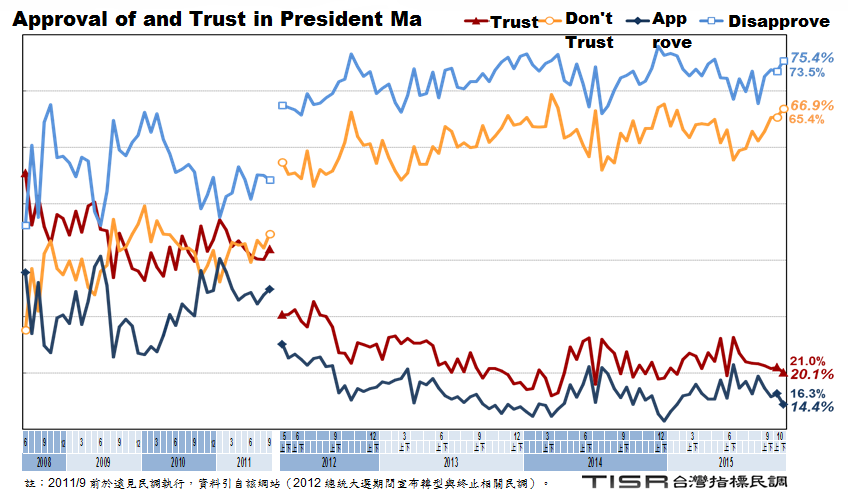
Taiwanese are also wary of Xi. In a May 2015 TISR poll, 18.9% of Taiwanese said they trust Xi, while 53.8% said they do not.
Furthermore, Ma’s and Xi’s parties are both very unpopular in Taiwan. Here is the latest TISR party favorability index. 50 is the baseline score of neutral favorability, with 50-100 representing increasingly positive feelings and 0-50 increasingly negative ones, and strong like dislike responses counting twice as much as moderate likes and dislikes.

In writing:
42.0% feel positively about the DPP. 34.9% feel negatively about it.
21.6% feel positively about the KMT. 61.7% feel negatively about it.
13.7% feel positively about the CCP. 60.7% feel negatively about it.
This lack of popularity is evident in presidential polls, where the KMT candidates have been very far behind all year. Here is the TISR presidential election tracking poll from late June through late October:
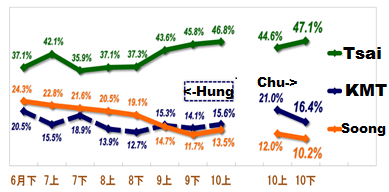
This month the KMT controversially replaced its first nominee, Hung Hsiu-chu (洪秀柱), with Eric Chu. Yet Chu is favoring little better than Hung. A late September TISR poll which asked which individual is to blame for Hung’s poor poll performance shows Ma is considered the biggest culprit:
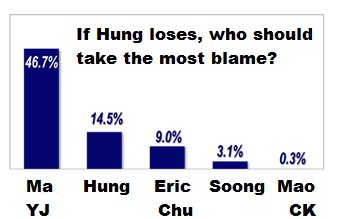 Furthermore, in an October 8 poll, the Cross-Strait Policy Association asked, “Who should take the responsibility for the KMT’s low election prospects, the KMT or Hung?” 75.8% of citizens blamed the KMT, just 5.8% Hung. The KMT is simply hated overall.
Furthermore, in an October 8 poll, the Cross-Strait Policy Association asked, “Who should take the responsibility for the KMT’s low election prospects, the KMT or Hung?” 75.8% of citizens blamed the KMT, just 5.8% Hung. The KMT is simply hated overall.
The late September TISR poll also reveals a strong plurality believe the DPP’s Tsai, rather than the pan-blue candidates, is the best choice to defend the Republic of China and national dignity:
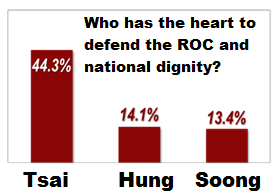
Taiwanese at odds with Ma’s and Xi’s positions
Most importantly, what will Ma and Xi talk about? If they wish to win over the Taiwanese public without repudiating their own positions, they must be vague. Polls show that the consensus of Taiwanese citizens is irreconcilable with Xi’s and the CCP’s official line, and that only a minority of Taiwanese are in agreement with the platform of their own president. This mid-October 2015 TISR poll asked Taiwanese which cross-strait formulations they agree with:
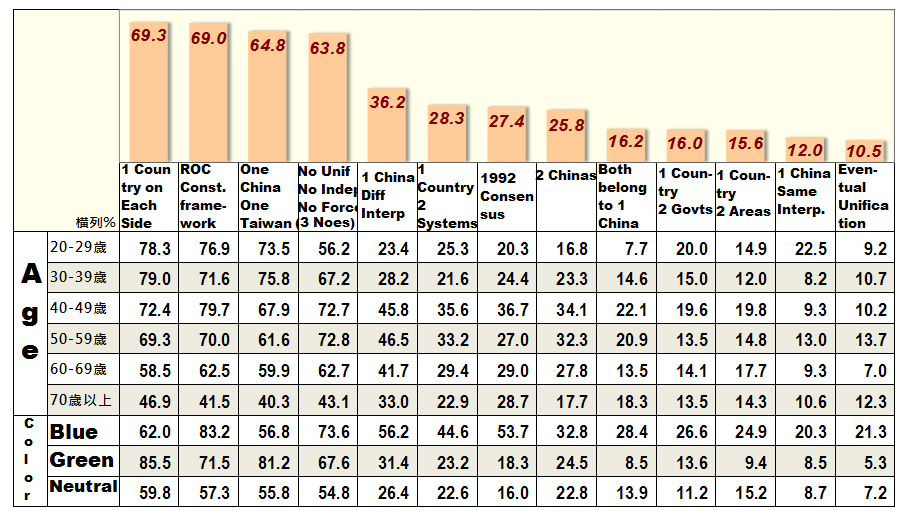
The 1992 Consensus and 1 China Different Interpretations are the platform Ma himself established and which he continuously defends. Many greens believe Ma supports Eventual Unification (and he has alluded to the same with remarks on the China-Taiwan relationship such as “what is long-united must divide and what is long-divided must unite”). However, to his credit, 3 Noes was a 2008 Ma campaign promise, and he does also agree with the ROC Constitutional Framework.
On the other hand, Xi’s and the CCP’s positions — Eventual Unification, Both Belong to 1 China, 1 China 2 Systems, and 1 Country 2 Areas — are all non-starters. But because Ma considers this meeting itself a victory — Xi had refused to meet him for years — some are wondering whether Ma gave up or will give up anything to Xi in return for this audience.
Taiwanese support the status quo, as this late June 2015 TISR poll shows:
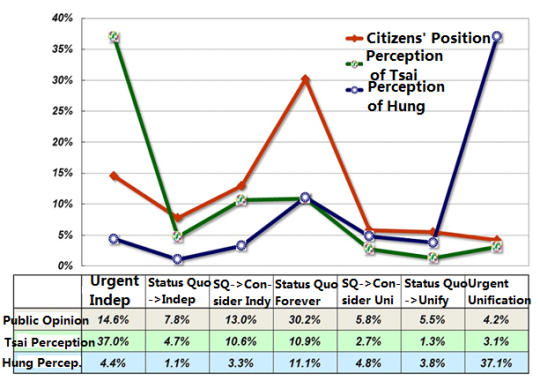
But what is the status quo? In mid-September 2015, TBT asked, “Do you believe Taiwan’s status quo is existence as a sovereign and independent country?” 70.4% said yes, and just 18.8% said no. This is not the kind of status quo the CCP can endorse.
On the ultimate question, the TISR tracking poll on eventual unification vs. eventual independence, updated late August and consistent for years, shows that 64.1% disagree with the statement “Taiwan and mainland China should eventually unite” (17.6% agree) while 49.7% agree that Taiwan should eventually become a new independent country (30.3% disagree).

In May, after the Chu-Xi meeting, TISR found 61.6% of Taiwanese disagreed with Chu’s statement that Taiwan and China are both parts of one China (26.7% agreed). They also gave this answer to a question about mutual recognition:
If Taiwan’s and mainland China’s central governments could give each other recognition, should they move toward forming an alliance or even a union as a new country in the future?
Yes: 24.7%
No: 56.2%
The tracking poll shows Yes falling and No rising:
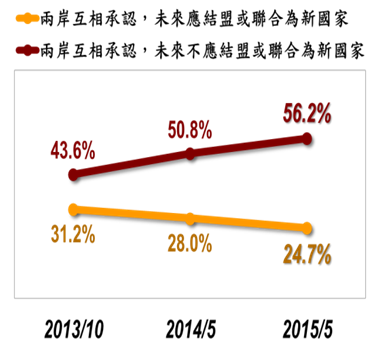
TVBS has also unearthed such sentiments. Back in October 2013, 66% of its respondents disagreed with President Ma’s statement that cross-strait relations are not international relations (20% agreed with it), and 42% even disagreed with Ma’s statement “citizens of both sides of the strait belong to the Chinese race” (中華民族) despite the ubiquity of such claims (44% agreed).
Therefore, polls indicate Ma and Xi should steer clear of talk of Taiwan’s future. But the two also should avoid confirming citizens’ impression China supports the KMT’s candidate and wants to poison the well against the DPP. Instead of helping the KMT, such a move could backfire. For example, this September, TBT asked, “In the 2016 presidential election, if China supported a certain candidate, would you thus support that candidate?” 85.6% said no, and just 6.3% said yes:
Definitely Yes: 3.2%
Maybe Yes: 3.1%
Maybe Not: 17.7%
Definitely Not: 67.9%
No Influence: 1.2%
No Opinion: 6.9%
Still more important is the example set by a very old poll result—the 1996 presidential election, in which Lee Teng-hui (李登輝) won a majority of votes despite strident PRC opposition that included missile testing in the Strait.
Caution’s the word
In conclusion, Taiwanese citizens are open to cross-strait talks but disapprove of Ma and Xi, their parties, and their positions. Yes, this summit is indeed historic, and it will likely be applauded abroad as a model of détente. But here in Taiwan where the KMT is on the brink of electoral perdition, citizens may instead be praying that Ma make as little “progress” as possible, and pundits are gauging the potential size of the backlash against the president rather the benefits he could accrue.

